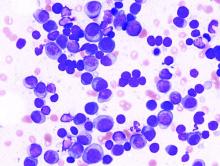CHICAGO – Daratumumab plus bortezomib, thalidomide, and dexamethasone (D-VTd) provided a “robust clinical benefit” over bortezomib, thalidomide, and dexamethasone alone (VTd) in a phase 3 trial of patients with newly diagnosed multiple myeloma, according to the trial’s principal investigator.
D-VTd produced significantly higher rates of stringent complete response (sCR) and progression-free survival (PFS) than did VTd, said Philippe Moreau, MD, of the University Hospital of Nantes (France).
Dr. Moreau presented these results, from the CASSIOPEIA trial, at the annual meeting of the American Society of Clinical Oncology. The findings were simultaneously published in the Lancet (2019 Jun 3. doi: 10.1016/S0140-6736[19]31240-1).
CASSIOPEIA enrolled 1,085 patients with newly diagnosed multiple myeloma who were eligible for high-dose chemotherapy and hematopoietic stem cell transplant (HSCT). This is a two-part trial, and Dr. Moreau presented final results from part 1.
In part 1, patients were randomized to induction with D-VTd or VTd, followed by autologous HSCT and consolidation with D-VTd or VTd. In part 2, which is ongoing, patients who achieve a partial response or better are randomized to observation or maintenance with daratumumab for up to 2 years.
Baseline characteristics were well balanced between the D-VTd and VTd arms. The median age was 59 years (range, 22-65) and 58 years (range, 26-65), respectively. Most patients had an Eastern Cooperative Oncology Group performance status of 0 or 1, and most had an International Staging System stage of I or II.
The median follow-up was 18.8 months. Most patients completed induction – 85% in the D-VTd arm and 81% in the VTd arm – and went on to HSCT – 90% and 89%, respectively. The most common reasons for treatment discontinuation in both arms were adverse events and progression.
Response and survival
The primary endpoint for part 1 was the rate of sCR at 100 days after HSCT. The sCR rate was significantly higher in the D-VTd arm than it was in the VTd arm – 29% and 20%, respectively (odds ratio, 1.60; P less than .0010).
The overall response rate was significantly higher in the D-VTd arm than in the VTd arm – 93% and 90%, respectively (P less than .0001) – as was the rate of minimal residual disease (MRD) negativity – 64% and 44%, respectively (P less than .0001).
Dr. Moreau noted that sCR and MRD negativity rates were superior with D-VTd across all subgroups except among patients with high-risk cytogenetics and International Staging System stage III disease.
“Dara-VTd resulted in a robust clinical benefit with a higher rate of response, including stringent CR, including MRD negativity,” Dr. Moreau said. “And this translated into a better progression-free survival, with a 53% reduction in the risk of progression or death.”
The 18-month PFS was 93% in the D-VTd arm and 85% in the VTd arm (hazard ratio, 0.47; P less than .0001). D-VTd reduced the risk of progression or death across all subgroups.
The median overall survival (OS) was not reached in either treatment arm. The 18-month OS rate was 98% in the D-VTd arm and 95% in the VTd arm. The 24-month OS rate was 97% and 93%, respectively.
“These results are the best ever reported in the setting of stem cell transplantation,” Dr. Moreau said.


